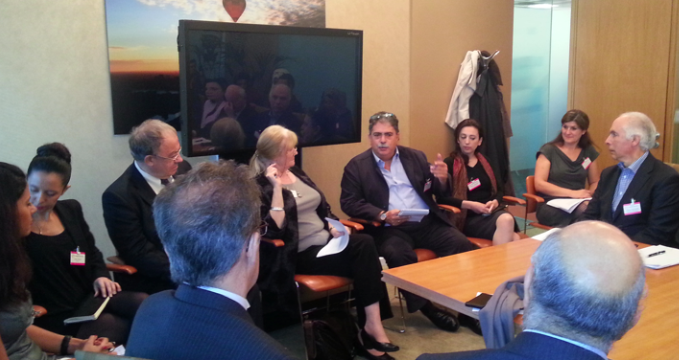Published: 29 October 2013
Region: Euro-Mediterranean


The Media Diversity Institute (MDI) was one of the participants that contributed to the debate.The panellists such as Naomi Sakr (Arab Media Institute, Westminster University), Lydia Elkhouri (MDI), Paul Taylor (Reuters), Olivier Roy (European University Institute) and young journalists from the Southern Mediterranean region discussed many issues from the risks and stereotypes of being a woman covering the Arab news, to the role of social media.
One of the first topics addressed was the importance for the foreign media to be able to access local information. “It is the local media that can bring a better picture of what is happening on the ground. They represent better all people in society, who can give voice to the voiceless“, affirmed Lydia Elkhouri, Project Manager at MDI.
The need of providing a balance and inclusive media coverage was also raised, especially in Egypt where there is a clear division within the society. The Egyptian journalist Nadine el Sayed affirmed that in her country, “people are not balanced anymore. Journalists do not know what to say because people do not want to hear the other side of the story. There has been a massive crackdown in the Egyptian media.”

Leila also told her experience of working on the ground as a female journalist. “A woman reporting in the field faces a different situation than a man. For example, women find more doors open, they can enter in the houses to speak with other women but men cannot do it. Being a woman is positive, but, it can be also negative as you have to struggle in men’s environments where we do not have the same authority.”
Some of the panellists as Nadine and Leila were also nominated for the Mediterranean Journalist Award, which was presented after the debate.
The jury highlighted the work done in particular by women in the coverage of the Syria conflict. It was the case of the Lebanese journalist Rania Abouzeld, who won the prize for the Press Category for her piece in the New Yorker on the situation in Syria “A black Flag and a Cup of Coffee in Raqqa”. She was one of the few journalists that reported from inside Hama after the Syrian military offensive in the city.
The Mediterranean Journalist Award aimed at rewarding exceptional journalistic productions, contributing to a better understanding of the diversity of cultures in the Euro-Mediterranean region. It promotes the positive role played by journalists in providing balanced and informed coverage of cultural issues in the region.
